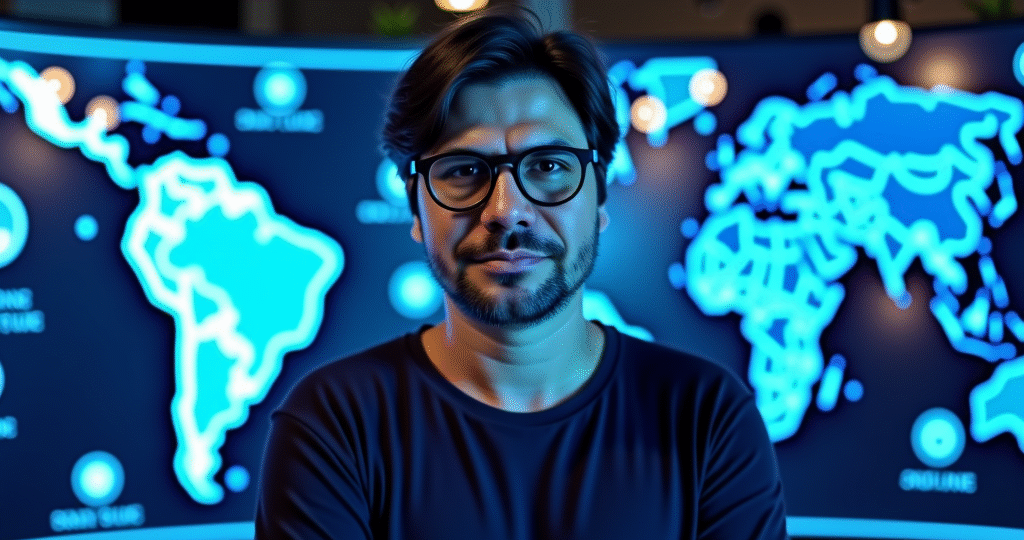From the Streets of ABC to World Leadership in AI - Why This Story Reveals the True Transformative Potential of Artificial Intelligence
August 16, 2025 | by Matos AI

One story caught my eye among all the AI news in the last 24 hours: 48-year-old Evandro Barros, who lived on the streets of the ABC region of São Paulo, is now recognized by the American magazine Technology Innovators as one of the Top 50 world leaders in artificial intelligence. He founded Data H, an incubator that has become an AI school, and his startups are already developing autonomous robots for iFood and algorithms for medical diagnosis.
This trajectory is not only inspiring - it perfectly illustrates the democratizing power of AI when combined with education, determination and ecosystems that support innovation. But the last 24 hours have also brought worrying news that forces us to reflect: are we harnessing this potential in an ethical and sustainable way?
The Billions Paradox: Too Much Investment, Too Few Results
While we celebrate stories like that of Evandro Barros, the corporate market faces a contrasting reality. According to O Globo report, companies are investing US$ 61.9 billion globally in generative AI by 2025, with growth of 94%. The paradox? Almost 80% of companies use AI, but few see a significant financial impact.
Join my WhatsApp groups! Daily updates with the most relevant news in the AI world and a vibrant community!
- AI for Business: focused on business and strategy.
- AI Builders: with a more technical and hands-on approach.
McKinsey identified this phenomenon as the “Paradox of generative AI”. It's like planting seeds in fertile soil, but not yet knowing when - or if - the fruit will appear. Gartner analysts predict that we are entering the “valley of disillusionment”, that phase where initial enthusiasm gives way to frustration before true consolidation.
It reminds me of the early years of commercial internet in Brazil. I remember companies investing heavily in websites in the 1990s, without seeing an immediate return. Some gave up. Others persisted and became e-commerce giants. The difference? Understanding that profound technological transformation takes time to mature.
When AI Crosses Unacceptable Ethical Lines
But not all news is optimistic. A Reuters revelation about Meta is deeply disturbing: internal company documents showed that its policies allowed AI assistants to “engage a child in romantic or sensual conversations”.
The 200-plus page document, approved by Meta's legal, public policy and engineering teams, also authorized AI to create racist statements and images of violence involving children. After exposure, Meta admitted its mistakes and removed these guidelines, but the damage was done.
This situation exemplifies why we urgently need solid regulatory frameworks. It's not about putting the brakes on innovation, but ensuring that it serves humanity, not works against it. As someone who has worked with thousands of startups, I know that the pressure for rapid growth can lead to dangerous shortcuts. But when it comes to protecting children, there is no acceptable shortcut.
Talent Fleeing to Where the Mission Makes Sense
Perhaps it's no coincidence that Meta is facing a serious talent retention crisis in AI. According to Forbes Brazil, Researchers and engineers are leaving for OpenAI, Anthropic and Google, even though Zuckerberg is offering billion-dollar packages.
Meta's retention rate stood at just 64%, while competitors keep up to 80% of talent. What does this teach us? High-performance professionals want more than money - they want purpose. They want to work in environments where their creations genuinely improve the world, not where internal policies allow inappropriate interactions with children.
This reinforces something I've always advocated: healthy innovation ecosystems are built with clear values, not just capital. Brazil has a unique opportunity to lead by example, creating AI companies that put ethics and social impact at the heart of their operations.
Brazil at the forefront: Augmented Intelligence in the spotlight
And speaking of Brazilian leadership, we have reason for optimism. O Cortex Summit 2025, Brazil's largest business AI event, takes place on September 2 in São Paulo with a focus on “Augmented Intelligence” - a concept that goes beyond popular generative AI.
Augmented Intelligence focuses on extending human capabilities through autonomous intelligent agents that automate complex processes, freeing up our human capital for creativity and strategy. This is exactly the approach I advocate: AI as a human enhancer, not a substitute.
With speakers from Google, Amazon, McDonald's and Latin American companies, the event reflects the growing maturity of the Brazilian market. We're not just consuming AI developed abroad - we're creating our own concepts and leading global discussions.
The Urgency of Responsible Regulation
Meanwhile, in Chamber of Deputies, experts debated the impact of AI on human rights. Bill 2338/23, which regulates AI in Brazil, is being analyzed after being approved by the Senate.
The warnings are serious: the World Economic Forum predicts that 40% companies are planning cuts via AI, affecting labor rights. Problems such as hyper-realistic deep fakes are already affecting Brazilian authorities and journalists. There are political, racial and gender biases in poorly supervised systems.
As futurist Amy Webb pointed out in Rio Innovation Week“The more complex AI becomes, the more we will trust it”. This makes it crucial that we build this trust on solid foundations of transparency, ethics and inclusion.
AI as an Employability Tool
But it's not all challenges. A Robert Half survey revealed that 57% of Brazilian professionals already use AI to improve their chances in selection processes. They are adapting CVs, simulating interviews, identifying relevant keywords.
Most interestingly, only 1% expressed concern about professional obsolescence. This shows the maturity of the Brazilian market in understanding AI as a complementary tool, not a threat. This is exactly the mentality we need to cultivate.
Lessons from those who left the streets to lead the world
Returning to the story of Evandro Barros, what elements of his career can we apply to the development of the Brazilian AI ecosystem?
Firsteducation as the great equalizer. Barros points out that his transformation began with access to knowledge. In Brazil, initiatives such as the WhatsApp groups I maintain (“AI for Business” and “AI Creators”) democratize this access.
Secondsmart international collaboration. He lives in Canada, taking advantage of more mature ecosystems, but maintains operations in Brazil. It's intelligent globalization: learn globally, impact locally.
Thirdfocus on practical applications that solve real problems. Its autonomous robots optimize deliveries; its algorithms help diagnose endometriosis. AI with purpose, not just for fads.
The Future We Are Building Today
The last 24 hours have offered us a perfect summary of the moment we are living in: inspiring stories of personal transformation through AI, along with serious warnings about ethical risks and the urgent need for responsible regulation.
The paradox of billionaire investments with no immediate return reminds us that profound transformation takes time. The talent crisis at Meta shows that professionals want to work with purpose. The growth of the Brazilian AI market proves that we can be protagonists, not just spectators.
But the revelation about policies that allowed inappropriate interactions with children reminds us that innovation without ethics is dangerous. We need regulatory frameworks that protect the most vulnerable without hindering innovation.
Evandro Barros' story teaches us that AI can be truly democratizing when combined with education, determination and supportive ecosystems. It doesn't matter where you come from - it matters where you're going and how you can use technology to get there.
In my mentoring work with startups and companies, I constantly see the transformative potential of AI when applied with a clear purpose and solid values. If you're building something in this area or want to better understand how to position your company in this scenario, let's talk. The future of Brazilian AI is being written right now - and there's room for many more inspiring stories like Evandro's.
✨Did you like it? You can sign up to receive 10K Digital's newsletters in your email, curated by me, with the best content about AI and business.
➡️ Join the 10K Community here
RELATED POSTS
View all



